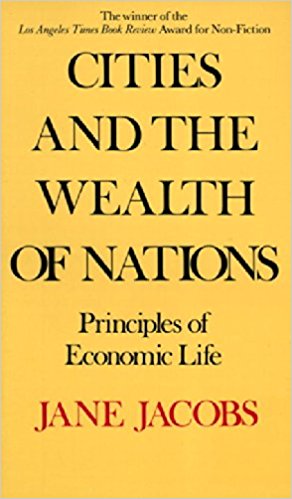Physical Address
304 North Cardinal St.
Dorchester Center, MA 02124
Physical Address
304 North Cardinal St.
Dorchester Center, MA 02124
In 2005, Joseph Gyourko published an economic history of Philadelphia. He explored the economic and policy factors that contributed to its population and job loss during the twentieth century. Gyourko’s outlook for Philadelphia was pessimistic. He argued that the city lacked the supply of skilled labor that would allow it to adapt to the rise of the service sector. However, in the year following Gyourko’s publication, Philadelphia’s population growth rate reversed, driven by foreign immigration and college graduates choosing to stay in the city where they went to school. In spite of this growth, the city has maintained an impressive level of housing affordability. Philadelphia obviously hasn’t had the level of demand pressure other coastal cities like New York or San Francisco have seen, but since 2005, it has experienced steady population has growth from 1,400,000 to 1,550,000 people. Among potentially comparable mid Atlantic and midwest cities, only Pittsburgh has lower prices. During its decade of population growth, Philadelphia’s home prices essentially tracked the rate of inflation. Unlike newer cities that have the option of relatively cheap greenfield development, the Census designates nearly all of Philadelphia’s neighborhood as urban, the densest designation. The city’s population growth has been accommodated through infill development and the renovation of old homes rather than through greenfield development. It’s not the case that Philadelphia’s zoning regime accommodates as-of-right growth. Philadelphia developers have to deal with a complex web of outdated Euclidean zoning rules and myriad overlays. But developers have generally been able to get the variances they need to provide a supply of housing that keeps prices from rising in response to population growth. Philadelphia doesn’t have organized political opposition comparable to NIMBY activity in more expensive cities. Residents’ reaction to calls for community involvement in the development process demonstrates the city’s anti-NIMBY tendencies. In 2012 the city implemented zoning […]
This post was originally published at mises.org and reposted under a creative commons license. It’s no secret that in coastal cities — plus some interior cities like Denver — rents and home prices are up significantly since 2009. In many areas, prices are above what they were at the peak of the last housing bubble. Year-over-year rent growth hits more than 10 percent in some places, while wages, needless to say, are hardly growing so fast. Lower-income workers and younger workers are the ones hit the hardest. As a result of high housing costs, many so-called millennials are electing to simply live with their parents, and one Los Angeles study concluded that 42 percent of so-called millennials are living with their parents. Numbers were similar among metros in the northeast United States, as well. Why Housing Costs Are So High? It’s impossible to say that any one reason is responsible for most or all of the relentless rising in home prices and rents in many areas. Certainly, a major factor behind growth in home prices is asset price inflation fueled by inflationary monetary policy. As the money supply increases, certain assets will see increased demand among those who benefit from money-supply growth. These inflationary policies reward those who already own assets (i.e., current homeowners) at the expense of first-time homebuyers and renters who are locked out of homeownership by home price inflation. Not surprisingly, we’ve seen the homeownership rate fall to 50-year lows in recent years. But there is also a much more basic reason for rising housing prices: there’s not enough supply where it’s needed most. Much of the time, high housing costs come down to a very simple equation: rising demand coupled with stagnant supply leads to higher prices. In other words, if the population (and household formation) is […]
Caos Planejado, in conjunction with Editora BEI/ArqFuturo, recently published A Guide to Urban Development (Guia de Gestão Urbana) by Anthony Ling. The book offers best practices for urban design and although it was written for a Brazilian audience, many of its recommendations have universal applicability. For the time being, the book is only available in Portuguese, but after giving it a read through, I decided it deserved an english language review all the same. The following are some of the key ideas and recommendations. I hope you enjoy. GGU sets the stage with a broad overview of the challenges facing Brazilian cities. Rapid urbanization has put pressure on housing prices in the highest productivity areas of the fastest growing cities and car centric transportation systems are unable to scale along with the pace of urban growth. After setting the stage, GGU splits into two sections. The first makes recommendations for the regulation of private spaces, the second for the development and administration of public areas. Reforming Regulation Section one will be familiar territory for any regular MU reader. GGU advocates for letting uses intermingle wherever individuals think is best. Criticism of minimum parking requirements gets its own chapter. And there’s a section a piece dedicated to streamlining permitting processes and abolishing height limits. One interesting idea is a proposal to let developers pay municipalities for the right to reduce FAR restrictions. This would allow a wider range of uses to be priced into property values and create the institutional incentives to gradually allow more intensive use of land over time. Meeting People Where They Are Particular to the Brazilian experience is a section dedicated to formalizing informal settlements, or favelas. These communities are found in every major urban center in the country and often face persistent, intergenerational poverty along with […]
In new research on parking policy in the Journal of Economic Geography, Jan Brueckner and Sofia Franco argue that residential developers should be required to provide more off-street parking in places where street parking contributes to traffic congestion. They argue that because traffic congestion is a negative externality, off-street parking requirements improve urban living. But street parking only contributes to traffic congestion when policymakers underprice it. Rather than addressing the externality of a government-created problem with new regulations, cities should price their street parking appropriately. Brueckner and Franco’s argument relies on the assumption that off-street parking will be under-provided without government intervention. They argue that because drivers circle their destination looking for free or cheap street parking, minimum parking requirements make people better off. The authors are correct in arguing that street parking contributes to the problem of traffic congestions. Parking guru Donald Shoup estimates that drivers who are circling around looking for parking spots make up 30 percent of downtown traffic. Cruising for parking imposes an external cost on others by causing everyone to waste time in slow traffic. While, Brueckner and Franco actually cite Shoup’s work on street parking and traffic congestion, they ignore his insight that when parking is priced appropriately, cities can eliminate this externality. The incentive to cruise for parking originates with public policy when city officials provide street parking at below-market prices. When parking prices are high enough, drivers will leave some parking availability on each block, eliminating the cruising problem without the need for minimum parking requirements. San Francisco’s SFPark program provides an example of successful implementation of variable pricing based on demand. SFPark has the goal of maintaining one to two available spots on each block so that drivers don’t contribute to traffic congestion while they’re looking for parking. When street parking is priced high […]

No one writer of the last 60 years has influenced urban planning and thinking as much as Jane Jacobs. It seems like just about everyone who has ever set foot in a major city has read The Death and Life of Great American Cities and most professional urban planners have embraced at least part of her ideas. But that was not the only book she wrote and the others deserve attention from urbanists. First published in 1984, Cities and the Wealth of Nations was her last book to focus on cities and her second concerned with economics. Conceived at the height of 1970s stagflation, Jacobs brought her considerable polemical skills to bear on macroeconomics and elaborated on the observations in The Economy of Cities. In that book she theorized that economic expansion in cities was driven by trade, innovation and imitation in a process she called “import replacement”. In this one she extended the idea, arguing that cities and not nation-states are the real basic units of macroeconomic life. She also examined how the economic expansion affected regions in differing geographic proximity and how import-replacement and the wealth generated by it can be used in ways that ultimately undermine the abilities of cities to create wealth, which she called transactions of decline. Import-replacement is one of Jacobs’ more controversial ideas, partially because it seems similar to a discredited development policy called import substitution and partially because her evidence is largely anecdotal, as Alon Levy wrote back in 2007. Nevertheless it’s the centerpiece of Jacobs’ economic theories. And dismissing her work based on a lack of conventional credentials ignores her entire rise to fame and influence. Two important things distinguish import-replacement from import-substitution. Substitution is a national policy pursued by governments with taxes, tariffs and subsidies while replacement is a process […]
New data keeps coming in that shows that increases in housing supply tend to be followed by declining rental rates, even in the cities facing the highest demand. After a boom year for apartment construction in 2016, rents are falling in New York City, San Francisco, and Washington, DC. Median rents for one-bedrooms across New York City fell by 9.1% in the past year. Even in San Francisco — the most productive city in the country — a burst of new supply in 2016 has led to falling rents. Estimates put rent year-over-year decline in prices at 1% to 9%. Rising vacancy rates and quarter-over-quarter declines in Seattle’s rental rates are a sign that it’s leaving a period of double-digit annual increases. A decade of increasing construction rates in DC has leveled off rent prices. Los Angeles has not seen the apartment boom that has benefitted renters in other expensive cities, and its rental rates are the fastest rising in California. Scott points out the striking correlation between housing construction and house prices in in-demand cities. This trend of declining rents is some very preliminary evidence against Tyler Cowen’s claim that densification in expensive cities will result in economic growth, but not falling rents as more buildings draw in more business activity and talent. A New York developer echoes Tyler’s view: “There are so many units, but then they all get eaten up. That is the way New York works.”

Inclusionary zoning allows a few people to live in desirable, new construction buildings for much less than market rates. But it also carries with it a slew of perverse consequences. Because it’s a tax on construction, it reduces supply. Inclusionary zoning also leads developers to build higher-end buildings than they would otherwise, further squeezing out lower- and middle-income tenants. While inclusionary zoning makes life easier for a few middle- and high-income residents lucky enough to secure below market-rate units in expensive cities, it also contributes to the regulatory mess that constrains housing supply in general. This in turn drives up the cost of housing. The effects of these supply constraints fall hardest on low-income residents who can least afford artificially high housing costs. By placing further constraints on housing markets, inclusionary zoning makes it so that resources dedicated to providing housing for the truly needy don’t go as far as they could in a less regulated market. Subsidies to middle-income residents come with the unfortunate side effect of making it more difficult for non-profits and government programs to make housing accessible to the truly needy. Recently I presented on a panel at Chapman University on the future of housing in Orange County. Our panel highlighted the tensions between housing programs designed to help low-income and homeless households and those designed to help middle-income households. While my talk focused on regulatory barriers that make housing unaffordable for people across the income spectrum, Maria Cabildo — a former non-profit developer for low-income housing — talked about her experiences building housing for the homeless and very-low-income families. Maria pointed out that market-rate housing is too expensive for minimum wage earners in every single county in the country. In expensive markets, policies designed to subsidize housing for middle-income people drives prices even farther out of reach for low-income […]

Homeownership boosters use many arguments in favor of buying rather than renting, one of which is that purchasing a home is a key part of the path toward a lifetime of financial success. They often say that renters are helping landlords profit when they would be better off paying their own mortgage instead. But a more nuanced analysis shows that it’s possible both for landlords to profit and for renting to make more financial sense than buying for some people. Someone purchasing a property to rent out will be purchasing an investment rather than a home — an emotionally fraught purchase often fueled with American Dream mythology. Because of the large transaction costs in buying and selling houses, people tend to buy the home they foresee wanting for many years after the purchase date. A childless couple might purchase a four-bedroom home in a good school district for the future, meaning that they end up over-consuming housing for their yet unborn children. If this hypothetical couple decided to rent until their children were school-age instead, they would likely be able to save and invest a substantial amount by spending less on housing in the near term. Would a landlord purchase this couple’s single family dream home? Probably not. Rather, with the same money, he might purchase a small apartment building in a less desirable part of town. These differences in purchasing decisions help to explain why landlords can profit in the same cities where people may not come out ahead by buying instead of renting. In addition to having disparate motivations when purchasing property, a potential landlord likely has other comparative advantages that make him more likely to profit from real estate relative to the average homebuyer. He may have above-average knowledge of which neighborhoods are likely to see […]

In The Road to Serfdom, F. A. Hayek tells us that intellectuals and governments in the twentieth century tragically abandoned the road to liberty in pursuit of collectivist utopias. That road stretched at least as far back as the democratic polis of ancient Greece, but it was not always straight and unbroken. Once, it was completely lost, only to be rediscovered centuries later. The idea of liberty emerged in the struggle between the forces of collectivism and individualism. It is the idea that each of us has a rightful sphere of autonomy in which we may be free from aggression. In politics this manifested itself as liberal democracy, in economics as market competition, and in the broader social realm as scientific advance, artistic expression, and religious tolerance. In his concise masterpiece, Medieval Cities: Their Origins and the Revival of Trade, the Belgian historian Henri Pirenne explains just how, long after the fall of the western Roman empire, the liberal idea gradually reemerged and how this was directly tied to the birth of the modern city. The Decline of Cities and Civilization Between AD 400 and 900 cities virtually disappeared from Europe. Even in Rome, which at its height had a population of one million, the population fell to mere thousands – most of whom were either Churchmen or those who served them. Bishops and clerics dominated urban life, while princes, who had little reason to spend time in dreary medieval towns, focused attention on protecting their feudal estates, earning tribute from their vassals, and exploiting the labor of their serfs. Then as now, nobles followed wealth, and in the Middle Ages, as trade among cities dwindled, the basis for wealth went from money to land. Money, liquid and essential for commerce, became superfluous, while control and acquisition of land became […]

The University of Chicago Press has published a “definitive” edition of F. A. Hayek’s The Constitution of Liberty under the editorial guidance of long-time Hayek scholar Ronald Hamowy. Given my interest in urban issues, it’s a good time for me to focus on chapter 22, “Housing and Town Planning.” It has several insights that I really like, but given the constraints of this column, for now I’ll talk about Hayek’s take on rent control. I must confess that it was several years after I became interested in the nature and significance of cities that I learned that Hayek had written anything on what we in the United States call “urban planning.” (Well, that’s not quite true; I did read The Constitution of Liberty as a graduate student, but in those days I didn’t appreciate how important cities are to both economic and intellectual development, so it evidently made no impression on me.) The analysis has a characteristically “Hayekian” flavor to it, by which I mean he goes beyond purely economic analysis and points out the psychological and sociological impact of certain urban policies that reinforce the dynamics of interventionism. The Economics of Rent Control Hayek’s economic analysis of rent control sounds familiar to modern students of political economy perhaps because it’s so widely (though not universally) accepted. This was hardly the case in 1960, when his book was first published. Hayek points out that despite the good intentions of those who support it, “any fixing of rents below the market price inevitably perpetuates the housing shortage.” That’s because at the artificially low rents the quantity demanded exceeds the quantity supplied. One effect of the chronic housing shortage that rent control produces is a drop in the rate at which apartments and flats would normally turn over. Instead, rent-controlled housing becomes […]